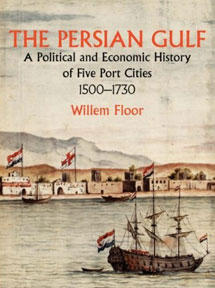
Cultural exceptionalism
Cultural biases and superiority fantasies
February 5, 2007
iranian.com Again, it is interesting to see that in his latest piece, "Doshmani-e Eslam ba Iran", Dr. Nooriala has noticed a very important aspect of the rise of Islam, one that is often lost in the traditional versions of the story of Islam which is often devotional. Economy, particularly commerce, was indeed essential to this rise and should always be considered. However, it is a pitty that although his previous article [see: "Biyaabaangardaan chegooneh pirooz mishavand?"] had maintained a level of scholarly detachment, this latest installment gets awfully close to the concept of Cultural Exceptionalism.
I shall refrain from making a long comment on this issue as it requires a much larger space than Dr. Nooriala has afforded it and I certainly dare not do the same. Suffice to say that at least some care in presenting historical facts would have been appreciated.
For starters, Abdu Manaf was not the father of both (Amro) Hashin and Umayya, rather Hashim and Abdu Shams. The latter, Abdu Shams, was the father of Umayya, a fact that is actually quite important in evaluation of the events. As such, the immediate presentation of the Umayyad as the nobility of Mecca and dismissal of the Hashimites as the underdogs is opportunistic and ahistorical. In fact, the Hashimite seem to have had the upper hand in the affairs and it was not initially the Umayyad, rather the Banu Makhzum (the family of the infamous Abu Jahl) who managed to depose the Hashimite from their exalted position.
Then, the Roman-Sasanian wars didn't "restart" from the death of Khosrow I. In fact, Khosrow never stopped fighting the Byzantines, including the famous episode of the sack of Antioch and the resettlement of its population in Weh-Antiok-Khosrow (AD 540).
Then, I wonder how Dr. Nooriala wishes to qualify his statements that the "Umayyad considered the caravan trade unfit for the Meccan nobility"! Harb b. Umayyad was a famous merchant, as was his brother Abul 'Aas. Harb's son, Sakhra Abu Sufyan was also the richest merchant in Mecca. Indeed, if you consult Mahmood Ibrahim's book "Merchant Capital and the Rise of Islam" you will see that the whole rise of Islam was dependent on mercantile activities which certainly did not exclude the Umayyads. What kind of nobility, other than that of the merchants, could Mecca have - considering that it did not have any agricultural production? So the whole argument seems to have been built on purposefully misrepresenting the facts on the ground.
 I do not deny the essentially hostile attitude of early Islamic leaders towards the Sasanian Empire. There are many ways to explain (and not to necessarily justify) this. Islam was a monotheistic, Abrahamic religion, and saw itself as a continuation of the other Abrahamic religions. So, it was only natural for them to see the Christians as friends. It also was pertinent that Islam had borrowed much from Monophysite Christianity and the Christianity practiced by the Arabs in Southern Syria. I do not deny the essentially hostile attitude of early Islamic leaders towards the Sasanian Empire. There are many ways to explain (and not to necessarily justify) this. Islam was a monotheistic, Abrahamic religion, and saw itself as a continuation of the other Abrahamic religions. So, it was only natural for them to see the Christians as friends. It also was pertinent that Islam had borrowed much from Monophysite Christianity and the Christianity practiced by the Arabs in Southern Syria.
Also, a major strategic mistake of Khosrow II Aparviz in removing the popular Nasrid dynasty from the throne of Hira had made most of the Arabs distrustful of the Sasanian policies, not forgetting the fact that Nasrids, starting from Nu'man III had themselves converted to Monophysite Christianity! Now, whether this should be taken as an essentially pro-Roman and anti-Iranian leaning of the early Islam is a hard thing to do. As you can see, the Islamic forces attacked Iraq and Syria (the possession of both Empires) at the same time, and indeed their take over of Egypt (the bread-basket of the Mediterranean) is more disasterous to the Byzantines than anyone else.
Getting over historical sensitivities, I want to make a comment about the term "racism" that has been thrown around on this subject and others involving the issue of the Iranian dislike of the Arabs. I would suggest that this is not racism, rather Cultural Exceptionalism. Racism for many reasons cannot be applied to this situation as it lacks many classical requirements, least of all the fact that the two populations, save their linguistic differences, are not actually racially that different.
However, much like the situation prevailing in the West today, the issue is one of cultural biases and superiority fantasies. Racism is now a dirty word in the "civilised" world, but claiming cultural superiority has now become alright, and even supported. Claiming an exclusive right to "rationality" and "democracy" and "freedom" is what we hear these days from many propaganda machines, and in turn, claiming to have had exclusive rights to "culture" "rationality", "science" and "civilisation" is what seems to be fashionable among historical idealists.
As racism came to be considered wrong and a sign of human immaturity, I do believe so will Cultural Exceptionalism. So, why not avoid making a mistake that we would have to regret later? Comment
About
Khodadad Rezakhani is a PhD student in History at UCLA. Visit his website, Vishistorica.com.
|